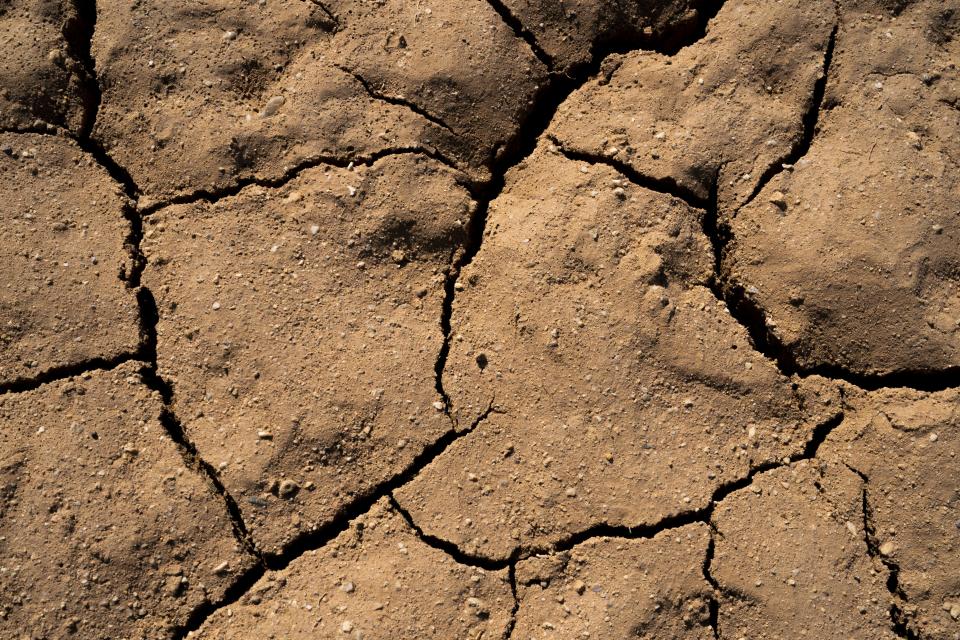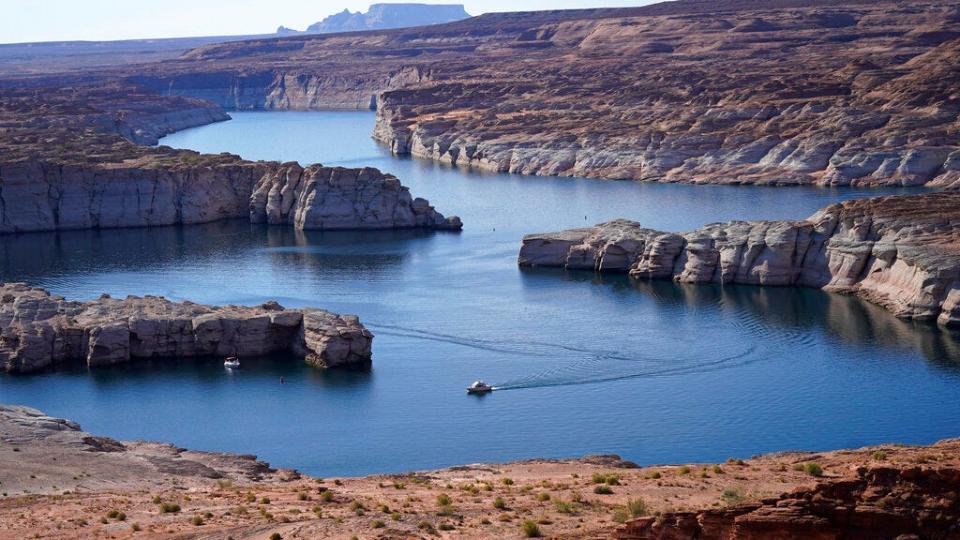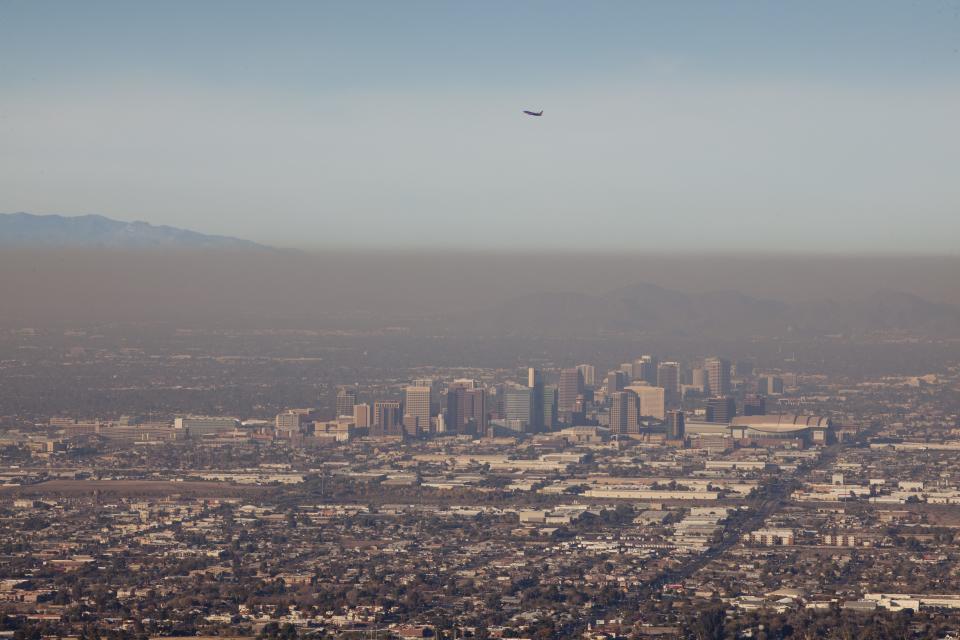'We are walking when we should be sprinting': Report charts escape from climate disaster
The international group of climate scientists studying the impacts of and solutions to global warming released their latest synthesis report Monday, adding to a long series of scientific reports published by the group since the first was released in 1990.
Their conclusions underscore that the effects of climate change will continue to worsen, with reduced water availability and food production, increased risk of pandemics, malnutrition, displacement and associated mental health impacts, declining biodiversity and ecosystem functioning in terrestrial, freshwater and marine systems, and a growing likelihood of wildfires, flooding, extreme weather and expensive damage to infrastructure and buildings.
"It warns that the pace and scale of what has been done so far and currently are insufficient to tackle climate change. Rapid and sustained emissions reductions and accelerated adaptation action is required within this decade to address change," said Hoesung Lee, who chairs the United Nations' Intergovernmental Panel on Climate Change. "We are walking when we should be sprinting."
The report synthesizes knowledge compiled in the current sixth assessment cycle's three main working group reports and three special reports. It "stands on the shoulders of giants" to bring not only a warning, but new insights, perspectives and hope, Lee said in a news conference Monday morning.
It emphasizes that human influences are to blame for many of the consequences, particularly the increase in heat extremes, ocean acidification, sea level rise and glacier melt. Worsening drought, fires, flooding and precipitation are exacerbated by humans burning fossil fuels, but to a lesser extent.

The report also outlines a pathway forward, through the turmoil. It calls for net zero carbon dioxide emissions by 2050 for a chance at staving off the worst impacts by keeping average warming under 1.5 degrees Celsius, about 2.7 degrees Fahrenheit, or by 2070 for a chance to limit the average increase to 2 degrees Celsius. Either timeline is ambitious given past progress toward net zero and the current reliance of global energy production on the burning of fossil fuels, which release heat-trapping greenhouse gases like carbon dioxide into the atmosphere.
The previous report:Climate experts say the world 'is at a crossroads,' but offer hope with concrete actions
The IPCC scientists see possibilities to achieve this goal with "rapid, deep and in most cases immediate greenhouse gas emission reductions," the report reads. Among the most promising mitigation options are scaling up solar and wind energy infrastructure, which are also some of the most affordable solutions. Arizona stands to play a large role in expanding the solar energy grid, with abundant sunshine and real estate on rooftops and open land.
It will be important to phase out coal and reduce methane emissions from oil and gas development, the report states. Bioelectricity, geothermal, hydropower and nuclear could be good, if expensive, energy alternatives. Carbon capture could provide a small but pricey margin of error while in the transition to renewables. Reducing the conversion of natural systems and enhancing carbon sequestration in agriculture are also essential steps toward a carbon neutral society. Improving the efficiency of buildings, vehicles, public transit, shipping, aviation and recycling systems will also be required.
All of these solutions are already possible with existing technology. But it will be important to implement them now, as the effective window for some of these actions is already closing.
"Adaptation options that are feasible and effective today will become constrained and less effective with increasing global warming," the report reads.
Rich nations must lead

The need for climate justice, or action to soften the disproportionate impact of climate change on already marginalized populations that have generally contributed less to the problem, is a key theme of the synthesis report.“Almost half of the world’s population lives in regions that are highly vulnerable to climate change. In the last decade, deaths from floods, droughts and storms were 15 times higher in highly vulnerable regions,“ Aditi Mukherji, director of climate adaptation and mitigation at the International Water Management Institute and one of 93 authors of the report, said in a press release.
Unnatural:Not-so-natural disasters are on the rise. What in the world is going on?
Up to 45% of global emissions are generated by just 10% of high-consumption households, the report found, while the bottom 50% contribute only 15% of emissions. Less developed nations, low-lying islands and poor communities with low per capita consumption rates and limited ability to adapt are expected to weather some of the harshest impacts of worsening storms, drought, crop failure and heat. A certain number of these events are already "baked in" to the future given past emissions. But there is still time to limit the damage, the scientists assert.
Rich nations, which have historically emitted the most by burning fossil fuels for energy and transportation, will be responsible for the lion's share of these cuts, owing to their still-high emissions and financial capabilities to make the infrastructure and lifestyle changes necessary to help reach the global target. In an address Monday, U.N. Secretary General António Guterres called for more affluent G20 countries to strive for carbon neutrality by 2040, a decade ahead of the global goal.
"Some parts of countries or regions must have that global net zero goal much earlier than 2050," Lee agreed. "They have the technology, finance and, I hope, political will. Therefore, they are in much better shape than other parts of the world to be on the trajectory toward the carbon neutrality by 2050."
Book review:As climate disasters force people to flee, a new book examines the modern migrant quandary
Lee also emphasized that scientists and leaders are not only talking about future impacts. The world's warming climate is already undermining livelihoods, damaging the global economy, challenging health care and threatening the ecological functioning of humanity's natural life support system.
"Every increment of warming will lead to rapidly escalating hazards and widening regional differences," he said.
“We live in a diverse world in which everyone has different responsibilities and different opportunities to bring about change," Lee said. "Some can do a lot while others will need support to help them manage the change.”
Acting on climate change based on ability rather than equal obligation will have financial benefits in the long term, the report's authors found. The cost of mitigation has repeatedly been shown to offer large savings, up to six fold, when compared to the expense of reacting to disasters or the failure to plan ahead, like the seemingly endless and multifaceted challenge the Southwest currently faces in light of drastically declining Colorado River flows.
Read our climate series:The latest from Joan Meiners at azcentral, a column on climate change that publishes weekly
Yet funding for climate mitigation falls far short of that needed to stay under 2 degrees Celsius of warming, the report states. While finance flows have increased and broadened over the last decade toward a goal set as part of the Paris Agreement in 2015 to mobilize $100 billion per year from rich nations to facilitate global adaptation, growth in this area has slowed since 2018. The $100 billion per year goal has never been met.
Assistance to developing nations has also not been distributed evenly, such as to sub-Saharan Africa, which will face some of the worst drought, crop failures and food shortages. Financing for fossil fuels still outpaces that for climate mitigation and adaptation, despite the evidence that the opposite is a better long-term investment, possibly because fossil fuel interests are so entrenched in modern systems of political power that a course change has been difficult to maintain.
"The question is, if sufficient capital is available, why is that capital not allocated to solving the urgent problems of climate issues?" Lee said.

'Does it feel like the same message over and over?'
In response to a question from the press corps during Monday's news conference about whether it feels like the scientists are forced to repeat the same message over and over again — that affects will worsen and time is running out to slow them — Lee said public support is still needed to achieve the necessary action.
"What we need now is a political will on the part of policy makers, also on the part of constituents who determine who will be the (next) political leaders," Lee said. "The second point is that we need public support to take the immediate action so that carbon neutral will be a realistic world we will have."
He called for "a personal motivation to be on that trajectory toward that net zero goal. I believe these three things are the necessary elements for the science to be transformed into a political outcome."
Dealing with climate anxiety:With 'Mass for the Endangered,' a composer has written a hymn for climate absolution
While Lee diplomatically skirted the question of whether the scientists are tired of convening to make the same repeated requests that people take their warnings about climate change seriously, there is evidence that the panel of scientists are indeed worn out. A press briefing scheduled for Sunday was canceled within 30 minutes of when it was due to go live, with IPCC support staff citing "major exhaustion over there" as the reason "a briefing today is not possible."
Climate science has progressed faster than most fields of research since the 1990s, with computer modeling of global impacts drastically reducing uncertainty and regional studies enhancing the specificity of conclusions and the targeting of locally sensible solutions.
But meaningful climate action has followed an entirely different trajectory. As media coverage of climate change increases and Hollywood takes up the charge with climate messaging embedded in productions like "Don't Look Up" and "Extrapolations," action by governments to motivate change and fund known solutions has been unfolding in relative slow motion.
In November, for example, 193 United Nations member states convened in Egypt for the 27th Conference of the Parties international meeting about climate change. The main outcome, hailed by many as evidence of a successful event, was the establishment of a fund to offset loss and damage sustained by developing nations due to the emissions released largely by developed countries. But without any real money actually deposited in the fund, the gesture may be as empty as the account, calling into question the value of flying so many delegates to Egypt to debate for weeks over what amounts to little more than a promise.
“Accelerated climate action will only come about if there is a many-fold increase in finance. Insufficient and misaligned finance is holding back progress,” Christopher Trisos, director of the Climate Risk Lab in the African Climate and Development Initiative and one of the report’s authors, said in a news release about the report.
COP 27:Who should pay for climate change? Finance a focus of climate talks at home and abroad
At the same time, progress does exist. Repeated surveys by the Yale Program on Climate Change Communication taking the public's temperature on climate issues show that engagement is at an all-time high and denial at an all-time low. In August, the Biden Administration responded to elevated concern with a historical investment in climate action when it passed the Inflation Reduction Act, which allocated $369 billion to facilitate the transition to a clean energy economy.
But many states, organizations and individuals remain confused about how to access that funding and innumerable cultural, political and logistical obstacles remain to installing the necessary infrastructure, ramping up battery production and phasing out reliance on fossil fuels.
Following the climate news cycle can seem simultaneously whiplash-inducing and redundant. Climate scientists, like many others, get tired of it all. But they're still writing reports and asking people to listen. In this latest publication they assert, again, that nothing less than humanity's collective future is at stake.
Joan Meiners is the Climate News and Storytelling Reporter at The Arizona Republic and azcentral. Before becoming a journalist, she completed a doctorate in Ecology. Follow Joan on Twitter at @beecycles or email her at joan.meiners@arizonarepublic.com.
Support climate coverage and local journalism by subscribing to azcentral.com at this link.
This article originally appeared on Arizona Republic: Latest climate report says quicker action is needed to avert disaster

